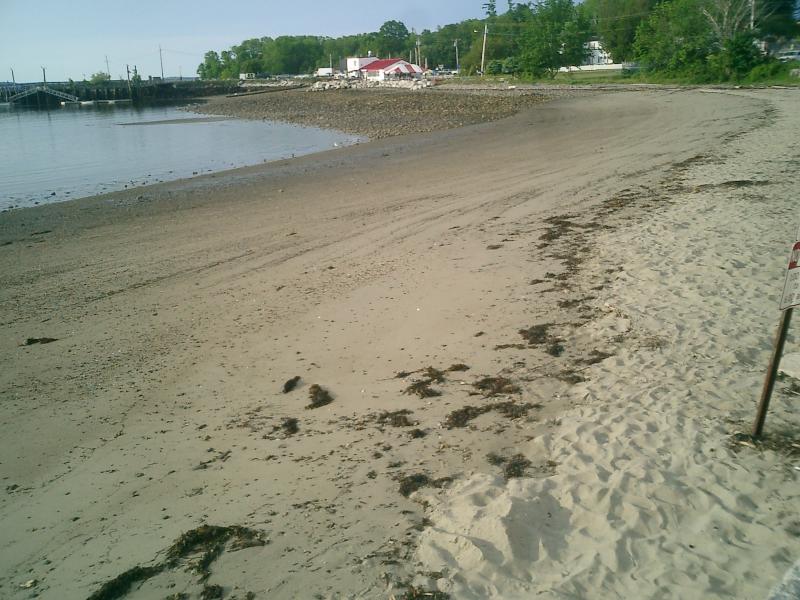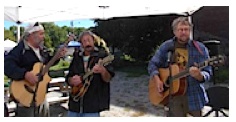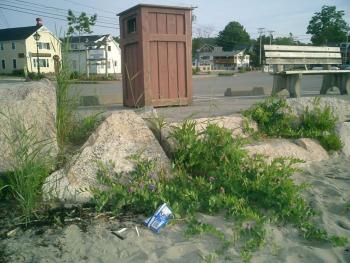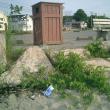This Week in Lincolnville: Down and dirty on the Beach
 What’s wrong with this scene?
Photo by Diane O’Brien
What’s wrong with this scene?
Photo by Diane O’Brien
 Some of the exciting stuff we deal with every morning.
Photo by Diane O’Brien
Some of the exciting stuff we deal with every morning.
Photo by Diane O’Brien
 The beach toys we find end up in this basket, free for the playing.
Photo by Diane O’Brien
The beach toys we find end up in this basket, free for the playing.
Photo by Diane O’Brien
 Lincolnville Beach looking pretty good at 6:30 on a Monday morning.
Photo by Diane O’Brien
Lincolnville Beach looking pretty good at 6:30 on a Monday morning.
Photo by Diane O’Brien
 Mystery writer Dorothy Cannell will present her work at the Lincolnville Library Wednesday evening.
Photo courtesy of Dorothy Cannell
Mystery writer Dorothy Cannell will present her work at the Lincolnville Library Wednesday evening.
Photo courtesy of Dorothy Cannell
 The Pinwheel Brothers will provide the musical half of Wednesday’s Library program.
Photo courtesy of Pinwheel Brothers
The Pinwheel Brothers will provide the musical half of Wednesday’s Library program.
Photo courtesy of Pinwheel Brothers
 What’s wrong with this scene?
Photo by Diane O’Brien
What’s wrong with this scene?
Photo by Diane O’Brien
 Some of the exciting stuff we deal with every morning.
Photo by Diane O’Brien
Some of the exciting stuff we deal with every morning.
Photo by Diane O’Brien
 The beach toys we find end up in this basket, free for the playing.
Photo by Diane O’Brien
The beach toys we find end up in this basket, free for the playing.
Photo by Diane O’Brien
 Lincolnville Beach looking pretty good at 6:30 on a Monday morning.
Photo by Diane O’Brien
Lincolnville Beach looking pretty good at 6:30 on a Monday morning.
Photo by Diane O’Brien
 Mystery writer Dorothy Cannell will present her work at the Lincolnville Library Wednesday evening.
Photo courtesy of Dorothy Cannell
Mystery writer Dorothy Cannell will present her work at the Lincolnville Library Wednesday evening.
Photo courtesy of Dorothy Cannell
 The Pinwheel Brothers will provide the musical half of Wednesday’s Library program.
Photo courtesy of Pinwheel Brothers
The Pinwheel Brothers will provide the musical half of Wednesday’s Library program.
Photo courtesy of Pinwheel Brothers
When our youngest son was about 13 he needed a job; the town needed someone to pick up Lincolnville Beach. It seemed a perfect match, with me the go-between — the contractor I was called — since our son was too young for the town to hire. But as his mother, I could hire him to work for me, the contractor. It was a cozy arrangement, and one that worked for a couple of years. Until, that is, he started to hate the job, the early morning nature of it (6:30 a.m.), the humiliation of it (carrying a little bucket for cigarette butts), and the relentlessness of it (every day).
Before that second August, his father and I had taken over and have picked up the Beach every summer since, some 23 years. That’s a lot of cigarette butts, trash bags, and miles walked. That’s also a lot of time thinking, because the work isn’t particularly challenging. We cover the same territory for 151 days each year. If you’re ever down there at 6:30 on a summer morning, you see we have a routine. Wally empties the five trash cans that line the seawalls, while I walk the parking area, sidewalks and the Beach itself, picking up litter.
Almost none of our “clients”, the folks we’re cleaning up after, are ever on the Beach at 6:30 a.m. Back in the late 1990s and early aughts we used to dodge pickups full of workmen, stopping by for their first cup of coffee at the Beach Store, meeting up with their crew before heading out to the job. It was the heyday of the MBNA halo, when gravel trucks hauling away rock from Ducktrap Mountain endlessly lumbered up and down our roads. Cement trucks, their drums turning, were on constant call to pour foundations, and every other vehicle was a tool-packed pickup heading out to some job.
Then came the late aughts. The larger economy nearly collapsed, MBNA disappeared, and with it most of the construction jobs. Since then, the Beach parking lot is virtually empty of guys going to work in the early morning hours. Interestingly, an empty house in our neighborhood has become a summer parking lot for workers heading to Islesboro; it’s much cheaper than the $10 fee charged in the state ferry lot.
Could this be our local manifestation of the one percenters versus the 99 percenters? Plenty of work over on that narrow, seven-mile-long island each spring, getting summer houses ready for the season. Ride the ferry any week-day morning and watch all the painters and carpenters and landscapers filling the seats.
Anyway, we generally have the parking lot to ourselves, except for the occasional traveler making a pit stop at our town Porta-potties, or perhaps someone parked facing the sea, starting their day with a few minutes of reflection. Some are so regular we greet each other every day; for several years a middle-aged guy with a ponytail and a bad leg pulled up on a huge motorcycle, to smoke and look at the water for five minutes. We only nodded in all those years of early morning communion before he slowly rode out of the parking lot, off to a day of something else.
I carry the little pail my son once dreaded, starting my rounds at the Porta-potty kiosk/information board, straightening up the community bulletin board, tracking down the pushpins that have blown off with their posters. Back in the day, before there was a kiosk or even a Porta-potty at Lincolnville Beach, there was a pay phone. Remember? When you got off the Concord bus at 10:30 at night, coming back from a week-end in Boston or a semester at college, you headed for the pay phone to tell the folks to come pick you up.
That phone used to be my first stop, checking for quarters. I was excited to find one, then agonized over what was the right thing to do. Stuff it back into the phone so Ma Bell would find it, or stuff it in my own pocket? One year I found three. I was never sure what ethical route to take here, so I pocketed them, and then crowed to my husband. We are unashamedly competitive when it comes to finding money on our rounds. One day I picked up seven pennies in separate spots. Once I found a twenty dollar bill. We go weeks without finding a cent. We find at least one wallet a season, and have managed to locate the owners every time. One year we picked up three paychecks from the wet pavement, all of them sodden, took them home and hung them up over the stove to dry, until their sheepish owners showed up to claim them.
CALENDAR
MONDAY, June 15
Joint meeting Lincolnville and Islesboro Selectmen, 5:30 p.m., Town Office
TUESDAY, June 16
Women’s Club meets at Lobster Pound, noon
Book Club meets, 6 p.m., Lincolnville Library
Beginners’ Band Concert, 6:30 p.m., Walsh Common
WEDNESDAY, June 17
Board of Assessment Review, 6 p.m., Town Office
THURSDAY, June 18
Free Soup Café, noon-1 p.m., Community Building, 18 Searsmont Road
Eighth Grade Graduation, 5:30 p.m., Lincolnville Central School
L.I.A. meeting, 5:30 p.m. potluck, Andy Hazen speaker, Lincolnville Improvement Association building
FRIDAY,June 19
Children’s Story Time, 10 a.m., Lincolnville Library
SATURDAY, June 20
Women’s Club Indoor Yard Sale, 8 a.m. - 1 p.m., L.I.A. building
Center Indoor Flea Market, 8 – noon, Community Building
Beach Farmers’ Market, 9 a.m. – 1 p.m., Dot’s parking lot
Household Hazardous Waste Day, 12:30-3:30 p.m., Transfer Station aka Dump
SUNDAY, June 21
Rev. Kate Braestrup guest preacher, 9:30 a.m., United Christian Church
COMING UP
June 22: Schoolhouse Museum opens for the season, 1-4 p.m.
July 11: Strawberry Festival, United Christian Church
Every week:
AA meetings, Tuesdays & Fridays at 12:15 p.m., Wednesdays & Sundays at 6 p.m.,United Christian Church
Lincolnville Community Library, open Tuesdays, 4-7, Wednesdays, 2-7, Fridays and Saturdays, 9 a.m.-noon. For information call 763-4343.
Soup Café, every Thursday, noon—1p.m., Community Building, Sponsored by United Christian Church. Free, though donations to the Community Building Fund are appreciated
Some things may surprise you: People rarely leave large, obvious trash on the Beach, such as cups from Dunkin Donuts or Happy Meal containers or even pizza boxes from the store across the street that sells them. I can go days without finding anything bigger than the palm of my hand. Rarely do I find napkins, paper plates, cans, or bottles on the Beach. Almost never anything nasty; in 23 years maybe two dirty diapers, a couple of condoms at the most, no hypodermic needles, although last week I found a thong. I do pick up dog poop every once in a while, scooping it into my little pail with a stick, a testament, I think to the efficacy of public opinion. These days people expect dog owners to carry a little plastic bag and pick up the poop; it would be socially unacceptable to leave it there, unless of course, no one is looking.
But what I do pick up tells me something about the folks I never see, the people who use “our” Beach. Lots of food stuff — gum wrappers crumpled into tiny balls, the spat-out gum (which I pry up from the pavement several times each day), sticky lumps of hard candy also spat-out and which I also pry up, sliced tomatoes and onions presumably discarded from Italian sandwiches, shreds of candy wrappers and potato chip bags which have been cleverly buried in the sand, but which are revealed when the wind blows away the sand, credit card register slips, the remains of a lobster feed, banana peels, great drifts of peanut or pistachio shells (another moral dilemma: do I really have to pick up every one? They’re biodegradable after all). I’m pretty sure people think the seagulls will eat the leavings of their feast, much as I toss an apple core out of the car window, because I convince myself the deer will eat it.
Band aids are a big item, and I find one nearly every day. They’re usually curled into a circle. They come off someone’s toe, I suppose. Little girl shoes are another common find; they used to be those jelly shoes children wore into the water. Then we found tiny crocs, all their holes carefully filled with charms. Today, fancy flip flops are popular. How do these kids get from the beach to the car without someone noticing they don’t have their shoes on? We always set them carefully on the top of the trash containers, hopeful the parents will come back looking for them. They almost never do, and after a few days we pitch them. Camera cases (never a camera inside), beach towels, T-shirts, underwear, glasses — we find them all, and give them their chance on top of the trash containers before throwing them away.
Beer caps (and the bottles and cans Wally finds in the trash cans), cigarette butts and the ends of joints are left by different clients, I imagine. Sometimes I decide to count the butts as I pick them up, but always lose track somewhere around 20 or 25, and I haven’t even left the parking lot. I find them everywhere. They’re confetti under the benches, testament to a really long, soulful gaze-at-the-sea; they’re stubbed out in the sand, carelessly tossed off the seawall to burn down to an ash, or cunningly hidden in the rock wall. The filters eventually turn to a fiberous mass, but they never completely decompose! At least once a summer I find a marathon smoke-out, 15 or 20 (a whole pack!) of the same brand, all sticking out of the sand in a neat little group. What terrible problem, broken heart, or perhaps bad bender was worked out on this spot I wonder the next morning as I count the butts into my pail. And what do those lungs feel like today?
I actually don’t resent the cigarette butts that I bend over to pick up dozens of times a morning. It’s my karma, I say, for the thousands of butts I carelessly tossed during my 11 years of binge smoking, starting at age 15. I smoked in the house, in the office, at restaurants, in the teachers’ room, in cars full of people, at my own wedding, and never gave it a thought. Everything I owned must have reeked of cigarettes. So now, as I clean up after other smokers, I feel sorry for their addiction, and grateful for my release from it.
One morning I spotted something metallic sticking out of the sand; I have good, practiced eyes for what doesn’t belong here amongst the pearly mussel shells, bright white clam shell fragments and flotsam of the sea. I picked it up, a dog tag-like disk printed with the name of a local crematorium and an ID number. I turned it over and over, wondering, as I often do, how such a thing got there, until I realized, oh, of course. The Beach plays an important role in people’s lives. It is the edge of the sea, the home to birds and creatures we barely understand. Stuff washes in from who-knows-where with no story clinging to it. The Beach is a natural place to say a final good-bye to a loved one. And then to leave a small memento behind for me to pick up.
Another Class of Eighth Graders
This Thursday afternoon, eighteen eighth graders – Dawson Allen, Ayla Curit, Anna Dare, Gabrielle Englander, Trajen Gilson, Ashley Jacobs, Andrew Kelly, Michael Kremin, Isabelle Lang, Noah Lang, Ionut Lodge, Sophie Love-Webb, Sydney Lytton, Zachary Markowitz, Abby Milner, Justin Secotte, Montana Stevens, and Carson Whitney – will join the long list of Lincolnville Central School graduates. The graduation ceremony will be held in the Lynx Gymnasium at 5:30 p.m. with a brief reception following in Walsh Common.
Every graduation is a poignant time for both the graduate and his/her parents. Leaving eighth grade, however, seems to me to hit parents the hardest, if only because now there’s no doubt that their child is growing up way faster than a mom or dad ever expected. From that first day of kindergarten, back when the five year old kept counting the days until school started, when a child could hardly wait for the adventure to begin, until this Thursday, when those same children are taller than their parents, has probably passed in a heart beat. Time may crawl for kids, especially during these warm spring days sitting in a schoolroom, but any parent will tell you they can’t believe how fast the years went by. . .
Best of luck Dawson, Ayla, Anna, Gabrielle, Trajen, Ashley, Andrew, Michael, Isabelle, Noah, Ionut, Sophie, Sydney, Zachary, Abby, Justin, Montana, and Carson!!
Women’s Club Banquet
Members and prospective members are cordially invited to the Annual Meeting of the Lincolnville Women's Club on Tuesday, June 16, noon at The Lobster Pound. Arrangements are to order off a special menu.
The group will meet in the private room to the left.
L.I.A. Meeting
The L.I.A. gathers Thursday, June 18, 5:30 p.m. for their always delicious potluck supper; bring a dish to share if you can, though there’s always plenty! The program this month will be given by Andy Hazen, founder of Andrew’s Brewery, Lincolnville’s own and only micro-brewery. Will there be samples, Andy?
LINCOLNVILLE CENTER INDOOR FLEA MARKET
The United Christian Church (UCC) will sponsor the Lincolnville Center Indoor Flea Market on Saturday, June 20 in the Community Building located at 18 Searsmont Road, Rt 173, in Lincolnville Center. Doors open at 8:00 AM and the market closes at noon. The market, which is held the third Saturday of the month through October, offers a wide selection of merchandise including antiques and collectibles, household items, crafts, and value-added farm products. Many vendors are returning for the market's third season. Space is still available. For details about table rentals contact the market coordinator, Mary Schulien at 785-3521 or e-mail . Income from table rentals will benefit the Community Building Fund.
Also this Saturday
The Lincolnville Women’s Club will hold an indoor yard sale at the L.I.A. building, 33 Beach Road, 8 a.m. – 1 p.m. Proceeds from the sale will benefit the club’s scholarship program.
June Library Presentation and Concert
At the Wednesday, June 17 Library program, writer Dorothy Cannell, an award- winning author of mystery novels and numerous short stories, will trace her writing career back to an English course she took in college where her instructor encouraged her to write for publication. Since then she’s published short stories and novels, several of which have been nominated for the Agatha award. “The Family Jewels” won in 1994. Dorothy is a member of Mystery Writers of America, American Crime Writers, and Sisters in Crime.
For the musical half of the evening, The Pinwheel Brothers, who play a mix of Americana and original jaunty, upbeat string music, will take the stage.The band formed after many shared open-mic and fiddle group jams. For the past three years they have been singing and playing throughout Waldo County including the Common Ground Fair and the American Folk Festival in Bangor. Band members include Vic Tredwell (bass), Phil Mancini (mandolin, banjo, and guitar), i California and Ben Hatfield (guitar).
Reserve tickets ($10 each) by contacting Rosey Gerry, 975-5432 or by email. The program starts at 7 p.m.
Other Library News
Pam Allen, a hand knitwear designer for many years, will lead a sweater design workshop on Tuesday, June 23 from 7 to 9 p.m. at the Lincolnville Community Library. She will show participants how to design a basic sweater to fit a particular size. The workshop will focus on creating a design rather than on hands-on knitting. Each participant should bring a calculator, graph paper, and a pencil with a good eraser.
Pam, who was editor-in-chief at Interweave Knits and then as creative director at Classic Elite, is now the owner of Quince and Co., a Portland-based yarn company she founded. She’s also the author of “Knitting for Dummies” and “Scarf Style,” published by Interweave Knits, and “Home,” a collection of projects for keeping comfortable and warm, published recently by Quince & Co.
This is the second in a series of fiber arts workshops supported by a generous grant from the Mudge Foundation. There is no charge for the workshop but registration is required. For more information or to register, call 763-4343 or email. Librarian Sheila Polson tells me that the workshop is full, but she’s taking names for a waiting list. By the way, Pam is a former Lincolnville, and later Camden resident.
In other Library news, the Book Group meets this Tuesday at 6 p.m. to discuss “The Dream Lover” by Elizabeth Berg. All are invited even if you haven’t read the book.
Pond News
Two of Lincolnville’s ponds, Coleman and Pitcher, have active associations made up of those who own land, camps or homes on their shores. Both put out lively and interesting newsletters each year; Coleman’s is edited by Whitney and Tony Oppersdorf and a paper copy is mailed to each member, while Pitcher’s is edited by Kathleen Oliver and sent electronically. Both groups address issues such as water quality, wildlife populations, and activities on their respective ponds.
For those living on Norton or Megunticook, the Megunticook Watershed Association carries on similar functions. I’m not aware of if they put out a newsletter, however.
Soup Café Update
The Soup Café, held every Thursday, noon to one, at the Community Building, had its one-year anniversary back in April. This is a lunch put on by volunteers, who take turns bringing soups (three kinds every week, one always vegetarian), cookies, fruit and bread. Lately, the bread has been donated by Borealis Breads in Waldoboro, special thanks to Bob Heald who drives down and picks it up every few weeks. The lunch is sponsored by United Christian Church, and, though there’s no charge for the meal, donations benefited the church’s Good Neighbor Fund this past winter, and now the Community Building kitchen fund.
Everyone is welcome. There’s usually music, from Sam Manning’s harmonica to Jack Silverio and Rosey Gerry on mandolin and guitar. Come by some Thursday and have a bowl of soup with us, nourishing for both body and soul; it’s just nice to sit and talk with people over a good meal.
Event Date
Address
United States

































